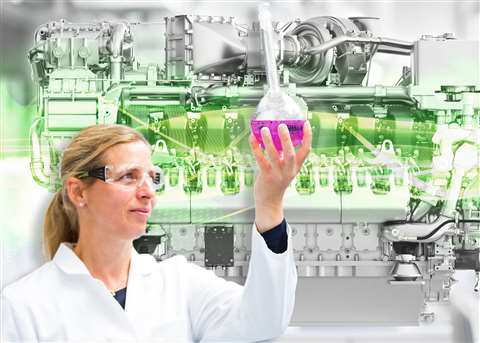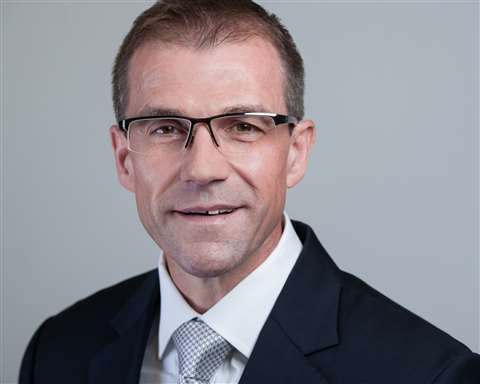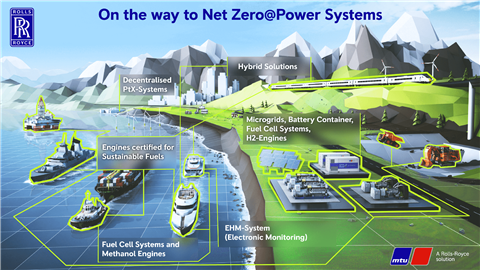Rolls-Royce Power Systems’ roadmap to net zero
20 July 2021
 Rolls-Royce Power Systems has unveiled its strategy to achieve net zero emissions by 2050 and part of the company’s plan involves the use of sustainable fuels for combustion engines.
Rolls-Royce Power Systems has unveiled its strategy to achieve net zero emissions by 2050 and part of the company’s plan involves the use of sustainable fuels for combustion engines.
Rolls-Royce Power Systems has announced an ambitious plan to reduce greenhouse gases and eventually move the company toward a climate-neutral future.
By 2030, the Rolls-Royce business unit said it plans to cut greenhouse gas emissions by 35% compared to its 2019 level through the use of new net zero and zero carbon technologies. This near-term target plays a significant role in Rolls-Royce Group’s ambition to achieve net zero no later than 2050.
 Andreas Schell, CEO of Rolls-Royce Power Systems.
Andreas Schell, CEO of Rolls-Royce Power Systems.
“With ‘Net Zero at Power Systems’, we’re not just taking action to protect the environment,” said Andreas Schell, CEO of Rolls-Royce Power Systems. “We’re re-aligning our strategy towards eco-friendly energy and propulsion systems. We already see these explicitly as growth opportunities for our business in the coming years.”
The announcement came after parent company Rolls-Royce recently issued its “Pathway to Net Zero’ program,’ which outlined its plans to net zero by 2050. Schell said that the timing of the Power Systems announcement was also important because “if you do it too early, you’re not credible.
“Quite frankly, we are now at the point where the plans are solidified, some of the pilots and the prototypes have been delivering results,” Schell added. “And it’s now time for us to really go out and speak to the market, speak to stakeholders, customers and investors.”
Not about CO2 ‘greenwashing’
Rolls-Royce Power Systems said a key element in achieving its goals is the certification of its most important mtu engine products to operate on sustainable fuels from as early as 2023. “The certification means that the new generation of Series 2000 and 4000 engines that currently account for 85% of our sales revenues, will be qualified to run on second-generation bio-fuels and on e-fuels,” said Dr. Otto Preiss, chief technology officer and chief operating officer.
 Dr. Otto Preiss, chief technology officer and chief operating officer, Rolls-Royce Power Systems.
Dr. Otto Preiss, chief technology officer and chief operating officer, Rolls-Royce Power Systems.
“This is not about CO2 ‘greenwashing,’ it’s not about trading or planting trees. It’s really about the complete balance of greenhouse gas emissions of our company and our portfolio being looked into, and net zero means that by 2050, we essentially want to be able to have, in a balanced view, no emissions whatsoever.”
Priess defined sustainable fuels as “fuels that are either generated by chemical process using green electricity and then either absorbing CO2 from the air or from other processes as they are emitted when the fuel is burned in the engine, or entirely CO2 free fuels.
“Take as an example hydrogen, which when produced with green electricity will not emit any CO2 at all. Another is second-generation biofuel up to then completely CO2 free fuels such as hydrogen.
“For us, the immediate first and important step is that all of our diesel engines are able to be certified and run with second-generation biodiesel, which will bring them into a CO2 neutral balance. That’s certainly one of the first and most important steps, together with blending approaches like taking a gas engine and blending with hydrogen – 20% or 40%, up to a purely hydrogen-based gas engine.”
Scenarios for engines in 2030
Priess said as part of developing a white paper, that Rolls-Royce Power Systems analyzed scenarios for the use of combustion engines in 2030. “We expect that for our applications in our markets, that about 60 to 80% will still be internal combustion engine-based,” he said. “Roughly half of them will run on sustainable fuels, while the rest would be pure e-based or would be pure CO2-free solutions, like fuel cells or fuel cells combined with batteries and other hybrid solutions.”
Sustainable solutions such as battery energy storage systems, hybrid propulsion systems for marine and rail applications and microgrids are already part of the Power Systems portfolio.
 Rolls-Royce Power Systems said its path to net zero emissions woud involve a range of technologies, including combustion engine burning sustainable fuels, hybrids, batteries and fuel cells.
Rolls-Royce Power Systems said its path to net zero emissions woud involve a range of technologies, including combustion engine burning sustainable fuels, hybrids, batteries and fuel cells.
Rolls-Royce Power Systems said it plans to use fuel cells in power generation starting in 2025, employed in prime and standby applications. In addition, the company said its development engineers are also working on engines powered by hydrogen and methanol, along with concepts for decentralized Power-to-X systems.
While one potential hurdle for hydrogen fuel cells is expected to be the availability of hydrogen and a hydrogen fuel infrastructure, Schell expects both to grow as the fuel cells become a greater part of the power mix.
“We’re talking individual instances for the start of the fuel cell,” he said. “It will not be a mass product with thousands of applications at the start. There will be a build-up and the build-up will have to be in an in conjunction with the build-up of the required infrastructure. It has to go hand in hand.”
Need help from governments
Rolls-Royce Power Systems said that in total, Power Systems products sold in 2019 will generate some 109 million tons of greenhouse gases over their service life in the field – almost double that emitted by the Greater London region every year. “That means that when it comes to lowering emissions, we have a lot of leverage,” Schell said.
“But the onus is on policymakers as well to put in place stable framework conditions for sustainable energy solutions in the areas of industry in which we operate, thereby providing clear incentives to participate in the changeover to sustainable products.”
To access the white paper “The Future of Combustion Engines as seen by Rolls-Royce Power Systems,” click here.
STAY CONNECTED




Receive the information you need when you need it through our world-leading magazines, newsletters and daily briefings.
POWER SOURCING GUIDE
The trusted reference and buyer’s guide for 83 years
The original “desktop search engine,” guiding nearly 10,000 users in more than 90 countries it is the primary reference for specifications and details on all the components that go into engine systems.
Visit Now
CONNECT WITH THE TEAM









